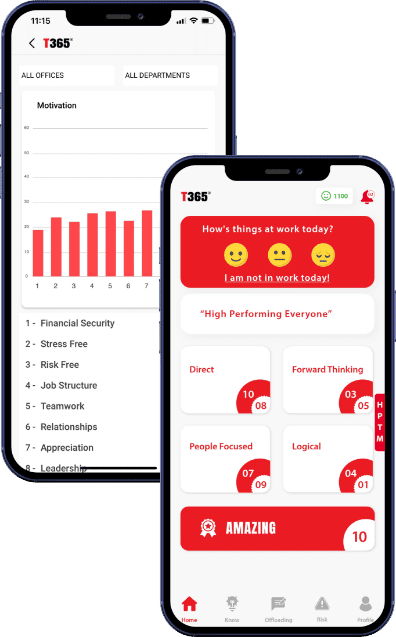Different Types Of Organisational Culture
What’s the definition of organisational culture?
It’s the shared values, attitudes and practices that characterise an organisation. Organisational culture plays a huge part in employee satisfaction and, ultimately, performance. Performance that, in turn, leads to consistent organisational improvements and success.
So, when people ask whether ‘organisational culture is really important?’, the answer is a resounding YES!
So, what different types of organisational culture are there? And what’s the best kind for your company?
What Is Clan Culture?
Does this have something to do with tartan and what’s under Scotmen’s kilts?
Erm, no.
Organisations with a ‘Clan Culture’ have a family-like feel. They are close-knit, work together as a community and put the needs of colleagues and staff before anything else. Sounds lovely, doesn’t it?
And there are some considerable benefits to implementing a clan culture in your organisation:
Productivity And Growth
Happy people = happy teams = happy business. And happy employees are considerably more likely to be more productive and contribute towards business growth.
And why are they happy? Because a clan culture puts their needs first and makes them feel valued, resulting in business-wide high morale.
With clan culture, there’s none of that “Oh, the managers are only out for themselves” disgruntledness you find people (often with some justification) gossiping and grousing about in some companies – instead, there’s a mutual feeling of trust between managers and their teams, inspiring a shared willingness to ‘go that extra mile’.
Openness And Support
Staff at all levels of a company with a clan culture can openly voice their ideas, knowing that they’ll be properly listened to and supported, if the general consensus is that their ideas are good ones to progress.
And if there are snags along the way, the person that came forth with the ideas knows that their team will support them.
All Singing Off The Same Hymn Sheet
Have you ever worked in an organisation where people wonder if they’re pulling in the same direction as everyone else?
Where teams and entire departments (and the people within them) seem to be at odds with one another and aiming for different goals?
This kind of confusion and disunity just leads to widespread organisational malaise.
Which is why companies with clan cultures take pride in reminding themselves and their people about their values, mission, vision and goals – and making sure everybody understands and agrees with them.
Are There Any Downsides To Clan Culture?
Sure, a few. Nothing is perfect.
Sometimes there’s the risk of too much talking and not enough action.
Or managers forgetting that it’s not their job to be everyone’s best friend (‘A friend to everyone is a friend to no-one,’ as Aristotle put it).
And, like every organisation, you’re going to find one or two people that cross boundaries and behave in a way that disrupts the equilibrium.
But these are all fixable problems. Where there’s a will, there’s a way – and why wouldn’t you be willing to address these issues to maintain a great culture?
What Is An Adhocracy Culture?
Adhocracy cultures are all about innovation and finding ways to keep ahead of the competition – and every other company in the world – by coming up with solutions to problems that people didn’t even know they had.
Apple is the most obvious example of an Adhocracy culture, for reasons we barely need to explain.
Adhocracies are characterised by risk-taking and bringing ideas to the table tied to market growth and organisational success.
Go Big Or Go Home
Adhocracies aren’t for the faint-hearted. It’s fly-by-the-seat-of-your-pants stuff. Expectations are sky-high. Everyone is using their own initiative to drive projects along at breakneck speed.And because of that, stuff gets done.
Constantly Learning
The greater the risk, the greater the potential for failure. But adhocracies are places where people dust themselves off after failures, learn from them, and implement those lessons in future endeavours.
Great Flexibility
People that shape and lead adhocracies are smart. They know that ideas aren’t just going to come to their teams while they’re tied to their desks 9-5.
A game-changing idea might come to people while they’re out walking or playing with their kids. They could come while they’re surfing waves on the ocean or meditating at a yoga retreat. And, so, adhocracies give their idea-generating people the flexibility and freedom to largely work where and when they want, as opposed to being shackled by outmoded Victorian ways of working.
Are There Any Downsides To Adhocracy Culture?
First, let’s focus on how remarkable properly functioning adhocracies can be. They’ve thrust mankind into space and put the power to change our lives for the better at our very fingertips.
But, boy oh boy does it take certain people to work and function highly in an adhocracy.
If you’re someone that likes (hey, and there’s nothing wrong with these things) a steady life, low pressure and even an element of predictability, you’re not going to enjoy or thrive in a culture like this.
It’s all about risk and reward. And, as much as the highs can be stratospheric, the plunging lows can take adhocracy-led organisations and the people that work for them to subterranean depths.
What Is Market Culture?
It’s all about that profit, baby.
Everything anyone ever does within a market culture company is evaluated with the bottom line in mind.
Every person has objectives and KPIs that align with the organisation’s overall goal.
And, in contrast to clan cultures (where the happiness of employees comes first) or adhocracies (where employees and leaders alike are given great freedom), market culture organisations put results well ahead of staff happiness. They are likely to be very hierarchical and place several layers of separation between ‘groundfloor’ employees and leaders.
If You Can’t Take The Heat
Organisations with a market culture are great places for the ‘go-getters’ in life: the kinds of people that love to compete and win.
Indeed, as Larry Ellison – chair of market culture-driven Cloud technology giant Oracle – put it: “I’m addicted to winning. The more you win, the more you want to win.”
So, if the desire to win again and again and again is a big part of your psyche, you’re going to love market culture.
All Aiming For The Same Goal
People that work for companies with a market culture sign up and buy into the vital importance of meeting quotas, reaching targets and getting results.
And that means there’s no room for confusion, with the key tenet being: “Get it done.”
These are results-oriented organisations, so that singular focus is vital focus.
Are There Any Downsides To Market Culture?
Have you seen Netflix’s Selling Sunset, about the The Oppenheim Group and the dramatic lengths its people will go to in order to secure the sales of multi-million dollar houses in the most desirable parts of LA?
Well, there’s a great example of a market culture. And do you know what? The ultra-competitive environment it creates seems to do its job.
But market culture wouldn’t be suitable for organisations that aren’t so focused on results and profit; nor for those that want to put the wellbeing of its staff high on its agenda.
What Is A Hierarchy Culture?
You’ll often find companies with an agile culture bearing similarities to adhocracies lambast organisations that fall back on the “But we’ve always done it this way” mantra.
And that’s because adhocracies and agile environments are all about finding new, more efficient and better ways of doing things. It’s very much ‘out with the old, in with the new’.
But there are some organisations – institutions, chiefly – that need a “If ain’t broke, don’t fix it” approach. And these are the kinds of organisations with a hierarchy culture.
Do It Right
While market cultures encourage their people to find a way to ‘get it done, no matter what’,
companies with hierarchy cultures are all about ‘get it done, but in the right way’.
Councils, prisons, schools, universities and even fast food chains are all about procedure. Sounds boring? OK, maybe it can be.
But when there are so many potential legal ramifications if things were to go wrong, it’s best to rely on tried-and-proven methods of doing things that prevent mistakes from occurring.
Chain Of Command
Hierarchy organisations adhere to the traditional corporate structure with a clear chain of command and multiple management tiers that separate employees and leadership.
Sometimes – but not always – there’s a dress code for employees to follow, like a uniform. And, while adhocracies are ‘wow, what’s going to happen next’ sort of places and clan cultures encourage debate and openness, hierarchy cultures are stable, risk-averse and have a set way of doing things.
Minimising The Chances Of Something Going Wrong
A hierarchy organisation’s goals are to execute things smoothly, produce consistent results and keep costs low.
Hierarchy cultures won’t look for wacky new solutions – they’re only interested in systematic problem-solving and efficient process control.
They’re the bureaucratic steady eddies in cop movies that try to get in the way of maverick detectives doing off-the-wall things. And they’re happy being that way.
Are There Any Downsides To Hierarchy Culture?
If you want to create a high-paced, risk loving, innovative experimental lab of a business then, no, the hierarchy model definitely isn’t for you.
But, on the other hand, if your job is to keep a great big behemoth of an old institution on track and its people out of trouble, then you’re going to be very glad of the hierarchy culture and structure that’s settled in place.
What Kind Of Culture Do You Want?
If you’ve read our other blogs and have got to know Tribe 365 in general, you’ll be able to hazard a guess at which of the above varieties of organisational culture we champion.
And if you’d like to learn more about how we can help your organisation develop a high performing culture full of happy and engaged people, please get in touch with the Tribe 365 team via our contact form or give us a call on +44 (0) 1325 734 846 today!

Interested in finding out more?
Book a meeting in with the Tribe team
today on +44 (0) 1325734847 or at
team@tribe365.co






















